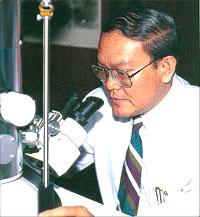 Professor
Dr. Prasert Sobhon was born on
December 8, 1943 in Sakolnakorn Province.
Following primary and secondary education
in Thailand, he went abroad to study
and received a B.Sc. in human biology
from the University of Western Australia
under the Colombo Plan Scholarship,
and a Ph.D. in cell biology and anatomy
from the University of Wisconsin,
U.S.A. under the Rockefeller Foundation
fellowship. He did his posdoctoral
study at the University of California
at Los Angeles, and later became a
WHO visiting research scientist at
National Institute of Medical Research,
Mill Hill, London. He was appointed
professor of cell biology and anatomy
in 1991. During his career he has
held many important administrative
positions, including being Chairman
of the Anatomy
Department, Associate Dean for
Academic Affairs, Faculty of Science,
and most recently Vice-President for
Academic Affairs, Mahidol University.
From his research contributions he
was meritoriously given the Mahidol
University Award for Outstanding Research
(1982) and Outstanding Scientist Award
(1995) from Thailand’s Foundation
for the Promotion of Science and Technology
under the Royal Patronage. Professor
Dr. Prasert Sobhon was born on
December 8, 1943 in Sakolnakorn Province.
Following primary and secondary education
in Thailand, he went abroad to study
and received a B.Sc. in human biology
from the University of Western Australia
under the Colombo Plan Scholarship,
and a Ph.D. in cell biology and anatomy
from the University of Wisconsin,
U.S.A. under the Rockefeller Foundation
fellowship. He did his posdoctoral
study at the University of California
at Los Angeles, and later became a
WHO visiting research scientist at
National Institute of Medical Research,
Mill Hill, London. He was appointed
professor of cell biology and anatomy
in 1991. During his career he has
held many important administrative
positions, including being Chairman
of the Anatomy
Department, Associate Dean for
Academic Affairs, Faculty of Science,
and most recently Vice-President for
Academic Affairs, Mahidol University.
From his research contributions he
was meritoriously given the Mahidol
University Award for Outstanding Research
(1982) and Outstanding Scientist Award
(1995) from Thailand’s Foundation
for the Promotion of Science and Technology
under the Royal Patronage.
His research work and interests
are in three areas of biomedical and
bioagricultural disciplines. First is the study of basic nuclear proteins
and chromatin organization in male
germ cells of vertebrates, including
humans, rodents, and frogs, and invertebrates
including a land snail (Achatina
fulica), an abalone (Haliotis
asinina) and sea urchin. Second is the characterization of antigens
of human blood flukes (S. japonicum,
S. mekongi) and human and animal
liver flukes (Opisthorchis viverrini and Fasciola gigantica),
their syntheses at the cellular level
in various tissues of the parasites,
and their immunodiagnostic and vaccine
potentials. The basic knowledge gained
from this study could be used in the
development of immunodiagnostic methods
and vaccines. Third is the study of the neurobiology and
reproductive biology of economic molluscs
(land snails and abalones), particularly
with respect to the identification
of neurosecretory cells that are involved
in the production of growth and gonadotrophic
factors which can stimulate growth
and gametogenic processes. The information
obtained could be applied in the culture
and aquaculture of these molluscs.
His research work has been supported
continuously by national funding agencies,
including the National Research Council
of Thailand, National Science and
Technology Development Agency, the
Thailand Research Fund, and international
organizations including the Ford Foundation,
Rockefeller Foundation, and UNDP/World
Bank/WHO Special Programme for Research
and Training in Tropical Diseases.
|


 Professor
Dr. Prasert Sobhon was born on
December 8, 1943 in Sakolnakorn Province.
Following primary and secondary education
in Thailand, he went abroad to study
and received a B.Sc. in human biology
from the University of Western Australia
under the Colombo Plan Scholarship,
and a Ph.D. in cell biology and anatomy
from the University of Wisconsin,
U.S.A. under the Rockefeller Foundation
fellowship. He did his posdoctoral
study at the University of California
at Los Angeles, and later became a
WHO visiting research scientist at
National Institute of Medical Research,
Mill Hill, London. He was appointed
professor of cell biology and anatomy
in 1991. During his career he has
held many important administrative
positions, including being Chairman
of the Anatomy
Department, Associate Dean for
Academic Affairs, Faculty of Science,
and most recently Vice-President for
Academic Affairs, Mahidol University.
From his research contributions he
was meritoriously given the Mahidol
University Award for Outstanding Research
(1982) and Outstanding Scientist Award
(1995) from Thailand’s Foundation
for the Promotion of Science and Technology
under the Royal Patronage.
Professor
Dr. Prasert Sobhon was born on
December 8, 1943 in Sakolnakorn Province.
Following primary and secondary education
in Thailand, he went abroad to study
and received a B.Sc. in human biology
from the University of Western Australia
under the Colombo Plan Scholarship,
and a Ph.D. in cell biology and anatomy
from the University of Wisconsin,
U.S.A. under the Rockefeller Foundation
fellowship. He did his posdoctoral
study at the University of California
at Los Angeles, and later became a
WHO visiting research scientist at
National Institute of Medical Research,
Mill Hill, London. He was appointed
professor of cell biology and anatomy
in 1991. During his career he has
held many important administrative
positions, including being Chairman
of the Anatomy
Department, Associate Dean for
Academic Affairs, Faculty of Science,
and most recently Vice-President for
Academic Affairs, Mahidol University.
From his research contributions he
was meritoriously given the Mahidol
University Award for Outstanding Research
(1982) and Outstanding Scientist Award
(1995) from Thailand’s Foundation
for the Promotion of Science and Technology
under the Royal Patronage.